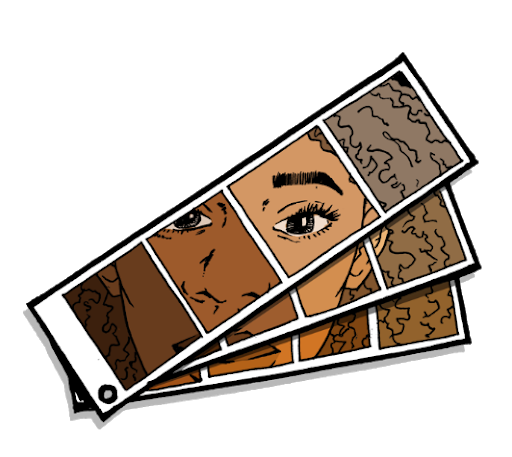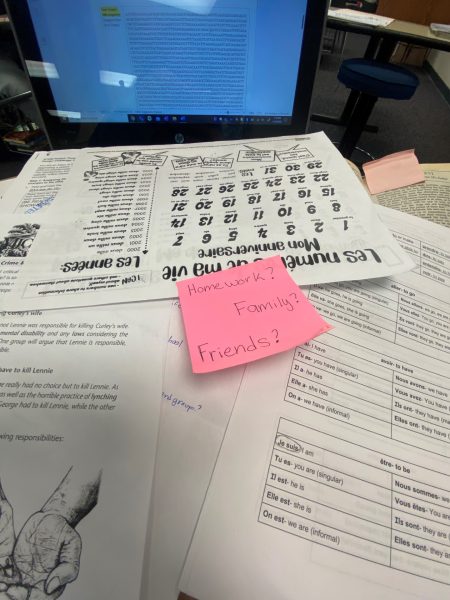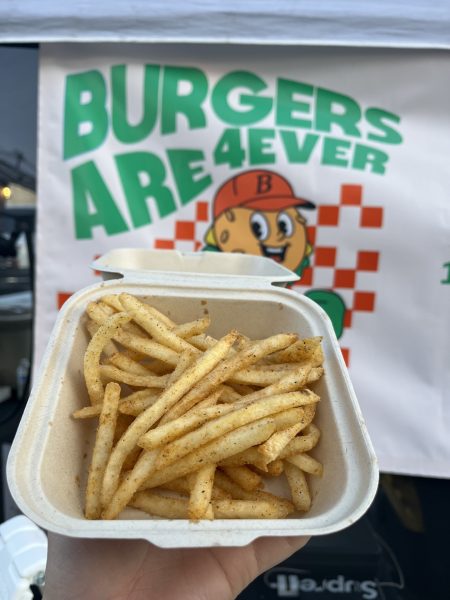Colorism On Air

Art by Colton Starley
From the years 1941 to 2020, even though not widely announced, colorism has been an uprising and taboo subject when brought up in discussion. From cartoons on Disney Channel to reality shows on TLC, people of color or of other racial differences have felt a profusion of rejection. Throughout many childhoods worldwide, people of color have experienced the similar, envious thoughts of being who they aren’t. As we look more into the subject of colorism, the world needs to start paying attention to what these everyday programs subtly shows. Once people with a darker complexions start to understand what is happening when it comes to why people perceive them in a certain way, realization and questioning start to arise.
The word colorism, when Googled, means “the prejudice or discrimination against individuals with a dark skin tone, typically among people of the same ethnic or racial group”. With this you could easily infer while reading that, even throughout one’s own races, there is a division when it comes to the how they are accepted and perceived. When it comes to the meaning of colorism, it’s not just the meaning of blatant discrimination, but it stands for the painful nonacceptance of their own people.
Whilst colorism on its own has a compact effect towards everyone’s perceptions, television plays a substantial part of its existence and its effects. When it comes to television, it is shown as simple yet important character input. A lighter skinned character, who was shown to be loved by everyone around – intelligent, pretty, just the overall adored way – is known as the main character. As for the main character’s best friends, they were shown as aggressive, unintelligent, and the unwanted side cast. This popular character placement became a trend for many shows and movies, which caused people who have been affected the most with discrimination who are darker toned, see themselves in those eyes of the supporting cast. With the lighter skinned characters, they have what many people may consider the “Light Skinned Privilege.” That’s one thing that I also had heard from many people who I have interviewed, that everyone envied the white girl/lighter skinned image that was shown on television.
When I reached out to some different racial minorities, all of the people had the similarity of having their race being underrepresented or often type casted onto the smaller roles such as the comic relief or the supporting cast. They all wanted one wish when growing up that was dramatically, shut down with reality, the want to be white. More specifically, to be the white main character that gained all of the attention, love, and praise while the comic relief were to fulfill their tasks of supporting the main character.
As a person of color, these could be noticeably clear or very subtle. It’s not in the matter of if it’s clear or if it’s a subtle change to make the show more appealing to the community of people with the mindset that the darker you are, no matter the race, the less screen time and praise you will receive. Now many people could argue when it comes to the subject of colorism and how darker skinned people are treated.
I had interviewed West High alum, Kim Huynh, an avid speaker on the lack of Asian representation, described her experiences with wanting to be like the highly shown protagonist, and the wish to be white. She had quoted, “I didn’t know to wish for more Asian representation. Instead I wished that I were white: I knew that I was the protagonist in my own life, and based on what I saw in the media, I didn’t think I could coexist with being Asian.”
As an example, on the subject of degradation of people, out of the bountiful examples, MTV’s 90’s music hit videos on television is a prime example of the T.V. music industry on women and people of color. When it came to the trends of having music videos being aired on television of the newest hits, people could then tell it was great. You get the best hits on television with a click of a button and enjoy its up tuned beats. But when it came to the lyrics many women, especially African American women, started to raise eyebrows at the suggestive themes and quotes. As you dig deeper through the subjects of colorism, you are soon to learn everyone has one thing in common; the means to compare themselves to white women.
But now throughout 2020 in the recent generations they have now branched out to other people of color which have shown main characters not being predominantly white. For example, Sarah Webb Ph.D., founder of Colorism Healing, is the person that’s resonated with me with her research in colorism and how television has benefited many people. She discusses situations where in her own childhood, she has compared herself to lighter skinned characters in shows and within her peers such as her sister. Words are powerful, and the mere sight of more representation when it comes to media and television could broaden the color palette. From being the villain, the pushover, the “ghetto” best friend, it’s all the same but by generation to generation the need for change becomes more prominent. When it comes to television and how people of the darker complexion are portrayed, it has come a long way from how it was when minorities were first aired. But colorism is still a hard hitting and difficult subject to talk about, especially if people have never experienced the problems that others feel. It doesn’t matter whatever race you are, colorism is real.






Olufemi Bossa • Feb 1, 2021 at 3:59 pm
Congratulations honey, that was beautifully done, l completely agree with you, so proud of you. Keep up the good work
Olufemi Bossa
carmen • Jan 26, 2021 at 8:19 am
lovely story
Janice Ledet • Jan 22, 2021 at 2:40 pm
What a powerful article! You are a brave and talented young lady. It’s not easy to be the one to bring up the subject of Colorism which is why it’s so important for young ladies like you to speak on it!
You made your mark on improving the works we live in by writing this article about this subject! Someone somewhere will be blessed by it!
Thank you!!!
Theresa Ledet • Jan 22, 2021 at 11:03 am
To ms Olayinka Bossa, you are a gem, your insight on colorism is excellent and on point. For such a young woman of color you bring a true reality that will open the awareness to all young people around the world. Thank you for joining in on opening up that door. May your journey take you to great places and meet great people.
Ps: You are an excellent writer!